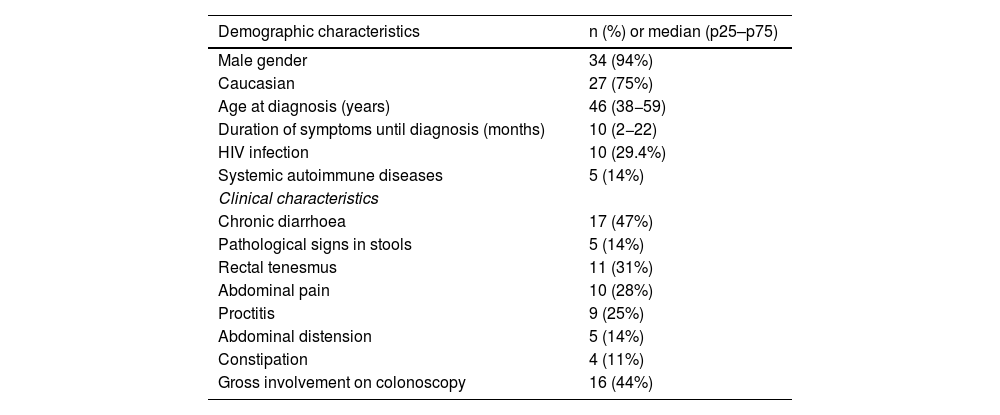Human intestinal spirochetosis (HIE) is a poorly studied clinical entity with variable clinical manifestations. However, in recent years it has gained special relevance because an increasing number of cases have been described in people living with HIV (PWH) and in patients with a history of sexually transmitted infections (STI) or immunosuppression.
MethodsRetrospective review of all HIE cases identified in a tertiary level hospital (Hospital Universitario la Paz, Madrid) between 2014 and 2021.
Results36 Cases of HIE were identified. Most cases corresponded to males (94%) with a median age of 45 years. 10 patients (29.4%) were PWH and 20 (56%) were men who had sex with men. Although the clinical manifestations were very heterogeneous, the most frequent was chronic diarrhea (47%), and up to 25% of the subjects had clinical proctitis. 39% percent of patients had been diagnosed with an STI in the previous two years, this characteristic being more frequent in PWH (90% vs. 28%; p < 0.01) than in patients without HIV infection. The STI most frequently associated with a diagnosis of HIE was syphilis (31%).
ConclusionHIE is frequently diagnosed with other STIs and affects mostly men who have sex with men, which supports that this entity could be considered as a new STI.
La espiroquetosis intestinal humana (EIH) es una entidad clínica poco estudiada. No obstante, en los últimos años está cobrando una especial relevancia dado que se han descrito un número creciente de casos en personas que viven con VIH (PVIH) y en pacientes con historia de infecciones de transmisión sexual (ITS) o inmunosupresión.
MétodosEstudio retrospectivo de todos los casos identificados de EIH en un hospital de tercer nivel (Hospital Universitario la Paz, Madrid) entre los años 2014–2021.
ResultadosSe identificaron 36 casos de EIH, la mayoría en varones (94%) y con una mediana de edad de 45 años. 10 pacientes eran PVIH (29,4%) y 20 (56%) eran hombres que mantenían sexo con hombres. Si bien las manifestaciones clínicas fueron muy heterogéneas, la más frecuente fue la diarrea crónica (47%), y un 25% tuvieron clínica de proctitis. El 39% de los pacientes fueron diagnosticados de una ITS en los dos años previos, siendo este hecho más frecuente en PVIH (90% vs. 28%; p < 0,01) que en pacientes sin infección por VIH. La ITS más frecuentemente asociada al diagnóstico de EIH fue la sífilis (31%).
ConclusiónLa EIH se diagnostica frecuentemente con otras ITS y afecta mayoritariamente a hombres que tienen sexo con hombres, lo cual apoyaría que esta entidad pudiera considerarse como una nueva ITS.
Article
Socio de la Sociedad Española de Enfermedades Infecciosas y Microbiología Clínica

Para acceder a la revista
Es necesario que lo haga desde la zona privada de la web de la SEIMC, clique aquí
Para realizar los cursos formativos
La actividad estará abierta para socios de la SEIMC. IMPORTANTE, recuerde que requiere registro previo gratuito. Empezar aquí









